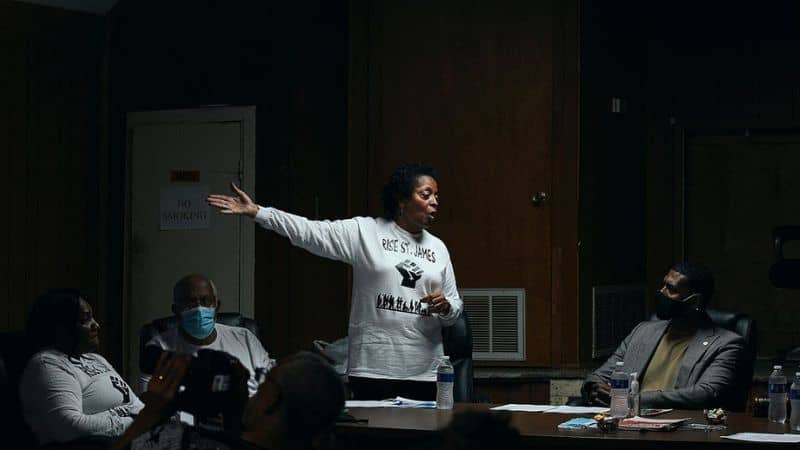Every year, forty million flip-flops are lost worldwide, and much of this summer footwear (just like a third of all plastic packaging) ends up in the ocean as toxic food for sharks. German documentarian Isa Willinger’s film Plastic Fantastic, screening at Dokufest in Kosovo, presents many disturbing facts and figures about the environmental impact of plastics alongside the more viscerally affecting imagery of coasts brimming with trash. It’s a crisis that is already well-documented. On this level, the documentary is not revelatory, but raising awareness and keeping the conversation at the forefront is imperative since the emergency has not been addressed and is worsening. The film questions what the most effective solution may be. Is it enough to modify what is made (to make flip-flops in a way that makes them less hazardous for wildlife, for instance), or is a radical reduction in plastic production the only way forward? The most illuminating aspect of Plastic Fantastic is its look into the fight for the narrative around plastics. A lucrative industry under the corrupting influence of money seeks to shore up its power by feeding the human reliance on plastic in daily life, convincing the public the material is helping us to live better through the most up-to-date technologies and innovation rather than destroying the planet and life as we know it.

Greenwashing
The idea in the public imagination that plastic is a product that appears from nowhere and goes nowhere started to shift in the ’70s and ’80s, as its inability to break down and be reintegrated into the environment after use became foregrounded. Today, the notion that as long as we put plastics in the recycling, everything will be fine has also come to be recognised as problematic. Plastics are made from fossil fuels, and a heat and power-intensive process is needed to crack the molecules necessary in a material supply chain that gives plastic a significant role in the activities of major global oil companies. Rather than dismantling the way they operate, corporate entities have often found it easier to protect their massive profits by simply telling the story more convincingly through advertising that plastic is necessary, touting its wonderful values as easily processed and attractive, and a key resource that when used as packaging can help food last longer, reduce wastage and therefore, supposedly, lessen carbon emissions. Not stopping at television advertisements to sway public attitudes to plastic, «educational outreach» is also carried out in elementary schools, training teachers to instil positive attitudes to plastic in the young. Plastics Europe distributes kits throughout Germany so that kids can experiment with making plastic in class, in a fun activity designed to familiarise them with its benefits for citizens and combat widespread alarm over packaging that ends up back in nature as a pollutant.
The idea in the public imagination that plastic is a product that appears from nowhere and goes nowhere started to shift in the ’70s and ’80s
Greenwashing has been gaining traction across the corporate sphere as organisations try to keep environmentally conscious consumers on board and minimise the reputational impact of any of their harmful practices. Only a small percentage of plastics are recyclable, and for many consumer goods, chemical additives and the range of different types of plastic in one product can make recycling impossible. But plastics companies strive to claim sustainability and invest billions in chemical recycling process research while saying «substantive solutions» are being pursued. The problem is landfills and plastic dumps rather than the material itself, the argument goes, in an industry that likes to paint itself as an innovator. Joshua Baca of the American Chemistry Council, a plastics industry trade association, is among numerous figures who give talking head interviews. He prefers not to be called a lobbyist, but he is a slick talker when it comes to plastic’s attractive qualities.

Around the globe
The film takes us out of cloistered offices and into communities around the globe where environmental devastation has impacted everyday life for the people who live amidst it. In Kenya, activists debate a boycott of the plastics that are pushed on consumers.
In Louisiana, plans for new ethane cracker plants that transform the fossil fuels on which plastic manufacturing depends threaten to add to already dangerous levels of industrial pollution. In the low-income, predominantly black community of St. James Parish, nicknamed Cancer Alley, cancer is rampant, and citizens are «living on death row» as a result of this health hazard, Sharon Lavigne from grassroots organisation RISE St. James explains.
A so-called Museum of the Future displays 400 products, including biodegradable shoes, that show useful items can be made less harmfully — but greed-driven corporations are unlikely to act on capability or ethics alone and will not radically alter their approach until they lose full control of the story around plastics. The film’s sobering message is that, despite there already being 500 times more plastic particles in the sea than stars in our galaxy, the growth rate of plastic production is only increasing.



